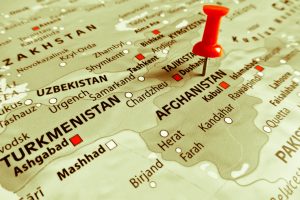Last week, a virtual donor conference convened by the United Nations accrued pledges of $2.44 billion for Afghanistan from 41 nations, falling short of the $4.4 billion target (itself down from the more than $5 billion the U.N. said it would seek back in January but still “the world’s largest appeal for a single country.”)
U.N. Secretary-General Antonio Guterres delivered remarks at the opening of the conference, hosted jointly by the governments of the United Kingdom, Germany, and Qatar, calling attention to the dire situation in Afghanistan.
“Some 95 percent of people do not have enough to eat. Nine million people are at risk of famine. UNICEF [United Nations Children’s Fund] estimates that a million severely malnourished children are on the verge of death, without immediate action,” he said, adding a looming economic collapse, an employment crisis, a drought, and skyrocketing food prices to the misery heaped upon Afghanistan.
“Wealthy, powerful countries cannot ignore the consequences of their decisions on the most vulnerable,” Guterres said, asking for “unconditional and flexible funding as soon as possible” so the U.N. could “reach 22 million people with food, water, health care, protection, shelter, education and other forms of life-saving aid.”
Guterres went on to stress the importance of access for aid workers — male and female — and for girls to be allowed access to not just education but the totality of modern life: “The inclusion of women and girls in all sectors of society and the economy is essential to overcoming Afghanistan’s intersecting economic, humanitarian and human rights crises.” But, he added, aid must not be withheld. “[W]e cannot use their education as a bargaining tool,” Guterres said, a comment arguably aimed at the World Bank and donors, such as the U.K., EU, U.S., and Turkey, which raised concerns about the Taliban’s treatment of women.
On March 30, days after the Taliban suddenly reversed a decision to allow girls to attend school past the sixth grade, the World Bank suspended four projects worth $600 million, which it had announced earlier in the month, over concerns about the continued banning of secondary education for women. The projects, as the BBC reported, would be restarted “only when the bank is confident that its goals can be met.”
At the pledging conference, U.S. Ambassador to the U.N. Linda Thomas-Greenfield delivered remarks in which she pledged an additional $204 million in new humanitarian assistance but also stated that “The Taliban will not control our humanitarian funding.” Thomas-Greenfield went on to say, “The people of Afghanistan have our unequivocal support. But the Taliban’s ambition to improve its own relations with the international community depends on its conduct.”
As desperate as the Afghan people are for assistance, the Taliban government does not appear ready to compromise on ideological issues and neither are international financial institutions, aid organizations, and donors. Among the most generous in pledging donations were the U.K. ($375 million), Germany ($221.46 million), and the United States ($204 million). The conference’s other host, Qatar, pledged $25 million. Absent from headlines was any news of pledges made by Russia or China.
On the same day as the U.N. pledging conference, China hosted the third “Meeting of Foreign Ministers of the Neighboring Countries of Afghanistan” in Tunxi, Anhui. The in-person meeting was attended by the foreign ministers of Iran, Pakistan, Russia, Tajikistan, Turkmenistan, and Uzbekistan as well as the Taliban’s Acting Foreign Minister Amir Khan Muttaqi.
In a joint statement, the group called “for further measures to improve people’s livelihood and guarantee the basic rights of all Afghan people, including all ethnic groups, women and children” and urged the Taliban to “to take more visible measures” to demonstrate its distance from terrorist groups. In the joint statement the seven nations pledged “to provide humanitarian assistance for the Afghan people, support Afghanistan’s economic reconstruction and self-reliant development, and strengthen regional connectivity,” but did so without specific pledges.
In a routine press conference on March 31, Chinese Foreign Ministry Spokesperson Wang Wenbin said, while outlining the results of the meeting, that “China respects the leading role of the Afghan interim government in receiving foreign aid and opposes the politicization of humanitarian aid. We urge the US to take primary responsibility as the culprit of the predicament in Afghanistan, stop unilateral sanctions and unconditionally return Afghanistan’s national assets.”
These divergences in policy approaches to Afghanistan map onto existing divergences in the international community, particularly the widening rift between the United States and its allies, and China, Russia and their partners, as can also be seen in responses to the crisis in Ukraine.
































